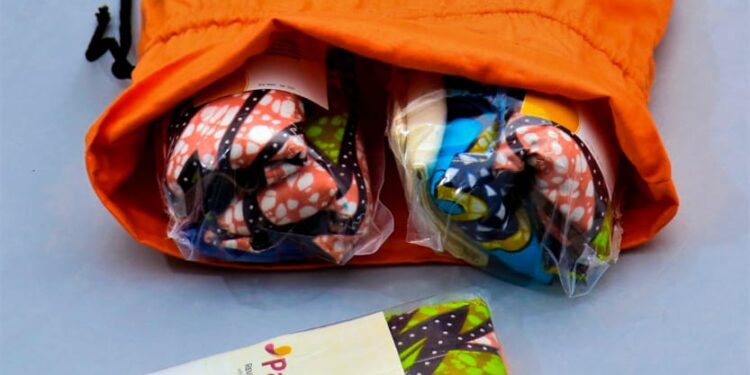Every person on planet Earth who experiences period will agree that preparing for the monthly visitor can be incredibly frustrating, not to mention expensive.
Louvier Kindo Tombe, tells the story of how an organisation in Cameroon, “Rinoo Cameroon”, partnering with “Royalty World”, a Belgian Social Entrepreneur, Filip Touseyn and other structures is providing response to Period Poverty among adolescent girls…
“Most, if not all adolescent girls in rural communities cannot afford Disposable Sanitary Pads regularly (every month),” Ngum Doris, Founding President of Royalty World, an organisation in Cameroon which deals with gender issues, told this reporter adding that;
“Period Poverty doesn’t only refer to limited access to financial resources, but also limited access to moral support and education.
Most young girls especially those at puberty, start menstruating before they are introduced to managing their cycles.
The effective management of menstruation has been identified by many as an under-recognised challenge for young girls in low income context.

With the constraints of access to Disposable Sanitary Pads in Cameroon, most young girls in improvised areas turn to use pieces of loin clothes and used napkins for their menstrual protection.
Some are even advised by their mothers to use them as the only possible option, since imported Sanitary products have become excessively expensive.
“What do you want me to do my son, to take care of my personal menstrual flow is financially challenging, and with these my three girls who all depend on me, the load is just too much, I have no choice than to seek for alternatives, by the way I am not the only person using this as a replacement for the imported pads.” A single mother explained to us with expectations that should there be a better option, she would not hesitate to use.
To an extend, these options seem to address the financial challenges in Period Poverty, but it however opens up more challenges.
Experience shows that using improvised products for menstrual protection usually gives rise to leakages and discomfort.
Strategically chosing what to wear just in case you have a menstrual leak can be even quite another challenge.
A 2016 survey done in Buea, South West region of Cameroon by Royalty World reports that one in seven adolescent girls say they have struggled to afford menstrual protection.
According to the President of Royalty World, Ngum Doris, “more than one in ten young girls have had to use improvised menstrual wears because they couldn’t afford the common sanitary product.”
In Bolifamba – Buea, South West region of Cameroon, Royalty World reports that most women live in fear and shame, and it limits their chances of achieving their goals.
In 2018, the United Nations (UN) reported that shame, stigma and misinformation which surrounds Periods can lead to serious health and human rights concerns. That explains why the UN has added menstrual protection to it’s 2030 Agenda.
Actually, much has been done to remove the stigma of menstruation, fight cost and help people care for themselves during their Periods, but there is still more to be done.
Today’s period products seek to solve many of the issues that menstruating individuals have dealth with for decades, from leaks and Period tracking to financial and environmental concerns.
Period hygiene has always been an ever-evolving production.
In 1897, Lister’s Towels were introduced by Johnson & Johnson as the first mass-produced and disposable menstrual pad. These were far from the Period Pads of today in that they were thick Pads of materials worn inside undergarments.
The Hoosier Ladies’ Sanitary Belt came a few decades after the turn of the century.
A few short years later, in 1929, Dr. Earle Haas, invented the first tampon. The adhesive sticky Pads used today weren’t introduced until the 1980s. Since then, they’ve been honed and updated to meet changing lifestyle, flow, and shape needs, but yet challenges are still very visible especially in low income context.
Recently in 2017, Royalty World, after identifying the challenges faced by adolescent young girls in protecting their period, sought to research on a more sustainable solution to help young girls effectively manage their menstrual period.
“The idea came to me when i saw a friend’s daughter rushed to the hospital because a piece of towel she inserted into her vagina as a way to absorb period blood tucked in, and my friend ended spending more, incurring serious debts just to safe the life of her child” Ngum Doris declared adding that;
“Royalty World was lucky to come across a Belgian entrepreneur, Filip Touseyn, with whom we shared the challenging experience of young girls in Cameroon, and he proposed to us a pattern for Reusable Period Pads.”

The importance of dealing with menstrual issues and the challenges faced by young girls in Buea pushed Royalty World to give it a special touch.
That explains the creation of “Rinoo Cameroon” which was conferred the task to develop a special reusable menstrual Pad, affordable and comfortable to all.
The particularity of “Rinoo Cameroon” is that it was charged to provide menstrual education besides the production of the Pad, and their mission started effectively in 2018.
“Our challenge started with identifying a name for the product and we finally settled on Papilio. Papilio is from butterfly to signify Transformation. Menstruation is that time of Transformation in a woman’s life, that is what motivates the adoption of the name.” Ngum Doris opened up.
Before working on the Papilio Project, Royalty World was into many other gender based initiatives providing sustainable trainings to young girls across the South West region, and Cameroon at large.
Responding to us in her small office space in Bolifamba – Buea, SWR, the President of Royalty World said; “It was not easy to design the Papilio Reusable Menstrual Pad. What you see here is the finished product. We were faced with multiple challenges, at same time we wanted to provide a cost effective product, we also wanted a product that would be very comfortable for use during flows and that which is environmental friendly. All the credit goes to Team Rinoo Cameroon.”

According to the international women’s movement, Women’s Environmental Network, “a woman would go through an average 11.000 Disposable Menstrual Products throughout the course of her life. This according to them is enough waste injected into the environment.
“It is true that in Cameroon, I have not yet come across a study on the impact of Disposable Sanitary Pads on the environment, but what I know is that they stay longer to decompose than most plastics.” Mr. Akuro Forsab, Coordinator of the Complementary Climate Change Mitigation and Adaptation Facilities Program, revealed.
The Papilio project started in 2018 with a sensitisation campaign providing health menstrual education and Reusable Sanitary Pads education to adolescent young girls in Buea. Then a single mother who was a seamstress in the locality was recruited and trained.
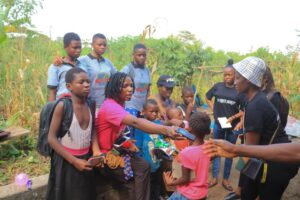
“Papilio was really a desire to see girls have periods with dignity, that is without shame and uncertainty. With the cloth Pads, you just have to wash, preserve and use it next month. That way your Period never takes you unaware and unprepared.” Doris Said.
Rinoo Cameroon thought they would just train the lone single mother and give her a machine to start producing the product but that was far from the reality.
“We later on discovered that a seamstress was not the only technical know-how needed for the project since it equally required health and environmental components. That alone made us to halt for a while to try to get the right persons on board but we continued with sensitisation.” The Papilio Operations Lead told us indicating that at one point, they were discouraged to carry on with the project, but their sensitisation team was challenged to design a sustainable product for people who experienced Period.
Ngum Doris Said “The credit of this project goes to Filip Touseyn, who stood by us financially, technically and morally.”
With support from partners, the structure recruited 11 more single mothers and 4 young girls in the production process. Some of them received training on health related and environmental issues.
The production of the first ever sample of the Papilio Reusable Menstrual Pads was a whole story on its own.
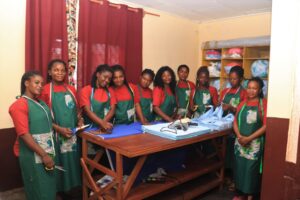
A day of work presently at the Production centre starts with a devotion to the Lord, Prayers and Worship before the three main teams seperate into their various units.
The cutting room where the various raw materials; local cotton, microfibre and water proof materials are shaped.
The Production room where the different shaped materials are assembled and the finishing room where the final products are packaged.
This was not the case at the begining of the project, where just to identify the right materials to be used according to Ngum Doris took over three months, not to talk of locating where to get them in good stock.
Just like with any other Initiative, the Papilio project recorded challenges at the begining.
“Our start was slow but have been evolving, we failed a good number of times, our final products were at times substandard. Most of our evolution challenge has been around the absorption capacity. The intensity differs from woman to woman. And this has been the area where we have improved, we now have extra layers for those with heavy flows. That could have only been possible by listening to customer feesbacks since we were developing the brand to satisfy them” Doris Said.
Directing us through the various units at the production centre, Ngum Doris Said another very challenging aspect of the project beside absurbancy was in shaping the product to fit and comfort women.
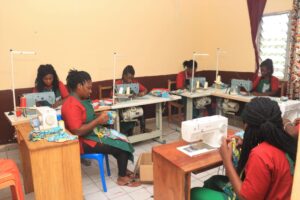
“It is very very difficult to design a product that would be used by others without taking their measurements, and we couldn’t have gone out to collect measurements. The very first samples we did were either too small, too tight, too loose, in short they weren’t comfortable following feedback from customers. We had to intensify research to come out with the present product which now fits effortlessly majority of our target users.” she said.
To make the Papilio Sanitary Pad project unique from others, it is providing affordable products alongside health and leadership education to ensure that girls reach their full potential. The girls are also being equipped as community leaders to further spread and promote Period Dignity.
So far, Rinoo Cameroon in just few years of existence partnering with Royalty World and other structures, and with limited resources have produced more than 40.000 Reusable Menstrual Pads, over 8.000 young girls have benefitted from the product and its services and employment offered to Cameroonians.
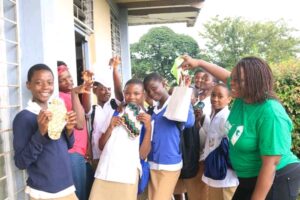
The project presently employs 15 production staff, 5 administrative staff and have equally employed over 80 people for part time purpose (women, youths and University students).
“I know of my friends during our secondary school days who used to skip classes monthly because of menstrual challenges, with the Papilio Reusable Pads, many are those who will profit from it, personally I have used the product and the comfort is unmatched.” Dilane, a university study told us.
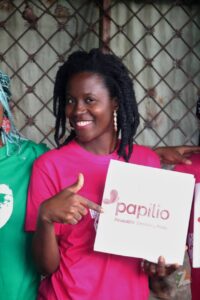
Talking to a distributor of the Papilio product at the mile 17 motor park in Buea, on the impact of the product, he declares to us that; “most young girls who bought the product from me usually declare that they were directed by friends who have used the product already”
Papilio Reusable Menstrual Pads, from the qualities on the pack of the product is very comfortable, money saving and made of high quality fabric.
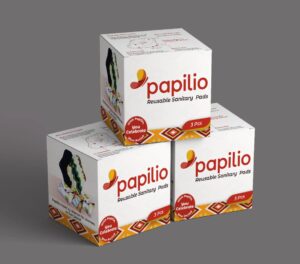
The top layer is of local cotton, the inner layer is made with absorbant micro fibre and the back layer of water proof material.
It has a high absorbancy rate and is easy to use. A pack of 6 Papilio can take a girl for about two years.
The product is responding positively to the financial and health challenges of young girls, but is however limited.
“The workshop is growing and our goal is to see every girl have periods with dignity therefore we are constantly in need of more training to upgrade and get the best quality pads. We are yet to render the Papilio Reusable Pads totally eco-friendly and efforts to that direction have far gone.” Doris revealed adding that;
“Our funds are limited and that limits us from producing in quantity that can reach every young girl in Cameroon and beyond, that is our objective.”
Royalty World it should be noted is in Bolifamba – Mile 16, Buea, South West region, but has networks in some african countries.
